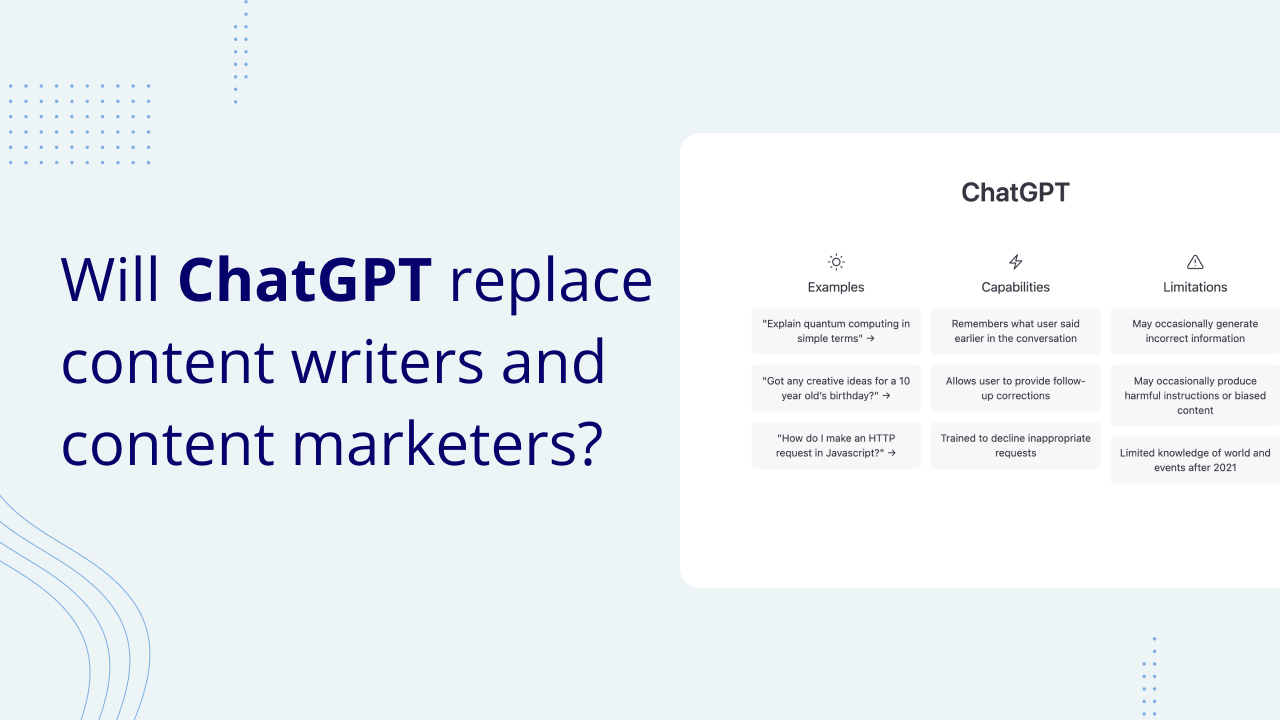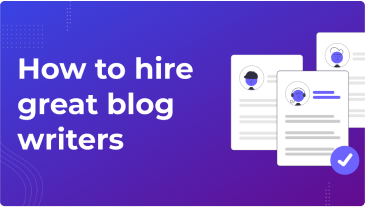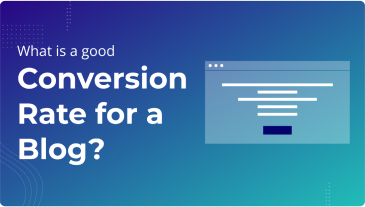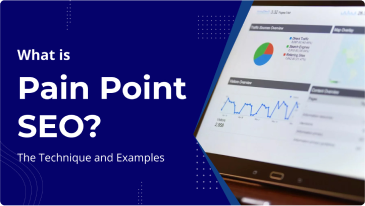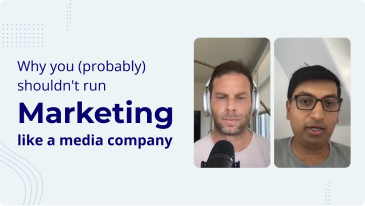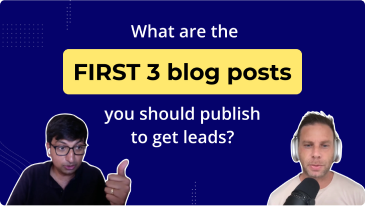Below, we cover 11 B2B content marketing agencies that we’ve either heard about or clients have used.
But before that, we discuss 4 questions you should ask an agency to determine if it’s a fit. Why is this important? Because it can be difficult to find a B2B content marketing agency that will actually produce the results you want since many of them offer similar services and claim to produce “valuable business results”.
In our experience working with dozens of different B2B companies, the number one result B2B companies are looking for is to increase high-quality leads. And yet, most marketing agencies focus on growing traffic. As we’ll discuss below, those two things aren’t the same. Growing your traffic doesn’t automatically result in more leads.
Note: Many companies wonder if they should hire an in-house marketer instead of an agency. We discuss the pros and cons of both options in this post.
Best B2B Content Marketing Agencies
- Grow and Convert
- Animalz
- Siege Media
- Optimist
- Codeless
- Omniscient Digital
- Seer Interactive
- Graphite
- Intrepid Digital
- Power Digital
- Fractl
If you’re interested in working with us, get in touch. You can also learn how to run our process yourself by signing up for our course.
Factors to Consider When Choosing the Best B2B Content Marketing Agency for Your Business
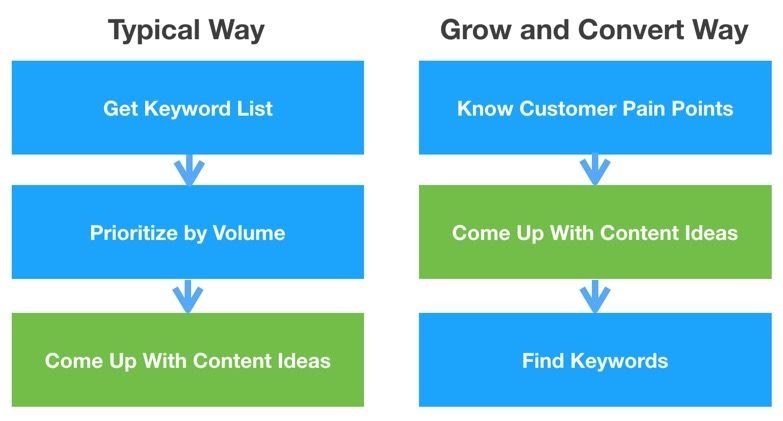
Factor #1: Do they prioritize buying intent or traffic when choosing which topics to target?
The number one reason why most content marketers and B2B content agencies don’t produce leads for their clients is that they focus content efforts on topics and keywords with low to zero purchase intent.
This is due to a mindset that says traffic potential should take priority, and with enough traffic, conversions will follow. But we’ve seen time and time again why this isn’t true:
When agencies prioritize traffic first, they choose topics and keywords that have the highest search volume. They look up terms related to their client’s category in SEO tools, sort by search volume, and that’s how they prioritize the order in which to tackle keywords. They tend to focus on “top of funnel” topics.
Top of funnel (TOF) topics are topics that presumably could be interesting to your target audience, but have little or nothing to do with the actual product or service you sell. They lack any indication that someone reading has intent to buy (or even do research about) your product or service. And as a result, conversion rates for this type of content are miniscule.
While this may be an effective strategy for certain “lifestyle” or B2C brands, it’s often a distraction for B2B companies who want to see measurable ROI and leads from their content marketing efforts — especially when there are people actively looking to buy right now.
It also misunderstands the breadth of different high-intent search terms and how many prospective customers of B2B products are actively searching for and researching products at any given time.
In our opinion, a B2B content strategy that does not prioritize showing up in those discussions is leaving extremely qualified leads on the table and is therefore inadequate.
Our strategy, explained below, goes after those ready-to-buy-now prospects first before moving up the funnel.
Note: This tendency to focus on TOF topics also stems from a cultural trait of content marketing which says that the role of content isn’t to sell — that it should only be about getting “brand awareness,” capturing people at the top of the funnel and nurturing them over months or years (through email marketing automations, remarketing ads, etc.), hoping they’ll one day become a customer. We think this “don’t sell” culture is completely misguided.
Factor #2: What’s their process for writing content that satisfies search intent and converts?
Most B2B content is often too basic to appeal to or resonate with advanced business-to-business prospects.
There are two layers to this problem. The first stems from the TOF topic issue discussed above.
As an example, say you have a B2B SaaS company that sells an IT product to chief technology or information officers. If you write a piece on “10 tips to improve your B2B tech stack,” what veteran CTO is going to read that?
First, they don’t have the time to read generic pieces like that. Second, they likely know more than the writer who wrote about that. Third, their social feeds and email inboxes are filled with titles like that, so the chances of them reading yours are slim. Finally, the beginner-ness of topics like this mean that the content inside is also bound to be too beginner. So even if they do read it, it’s not likely to impress them enough to drive them to explore your product, start a trial, or request a demo.
The second layer has to do with the way most B2B content is actually written. Typically, a marketing manager hands freelancers or agencies a list of keywords or topics, and the writer, who is rarely a subject matter expert on the topic at hand, ends up writing what we call “Google research papers.” Like a high school student doing a research paper, they Google around the topic they were given and regurgitate what everyone else is saying on a given topic. (In their defense, what else are they supposed to do? The process itself is what’s broken. Below we explain how we have gone about solving this.)
As a result, even if content marketers get topics right, the content inside the article is still undifferentiated and ineffective at generating actual leads.
Factor #3: Do they promote the content they produce?
Outside of topic selection, another common issue we have seen is that most content “marketing” agencies don’t actually promote or distribute content — they are actually just glorified writing services.
At best, they might share the content they write via your own brand’s social media marketing channels (tweet it out for you, share it on your LinkedIn page, etc.). But outside of that, if you ask them how they promote content, they’ll often just say, “We publish it and wait for it to rank in Google.”
This leaves businesses waiting around for articles to rank while their content sits on their site doing very little. And because search engine optimization (SEO) takes time to work, that often means several months pass by before content even begins getting traffic, let alone conversions.
Factor #4: Do they report on leads?
Finally, all of this culminates in arguably the biggest issue for us in our past experiences working with content agencies: They are unwilling to hold themselves accountable for generating leads.
They’ll report on metrics like pageviews and traffic, or impressions in organic search (or worse, simply wordcount and number of pieces published). But when it comes to getting actual ROI from content marketing, all the pageviews or impressions in the world mean nothing if that content isn’t producing any measurable leads.
These are the key problems we set out to solve when we decided to start our agency. Now, let’s look at how we’ve done that.
1. Grow and Convert
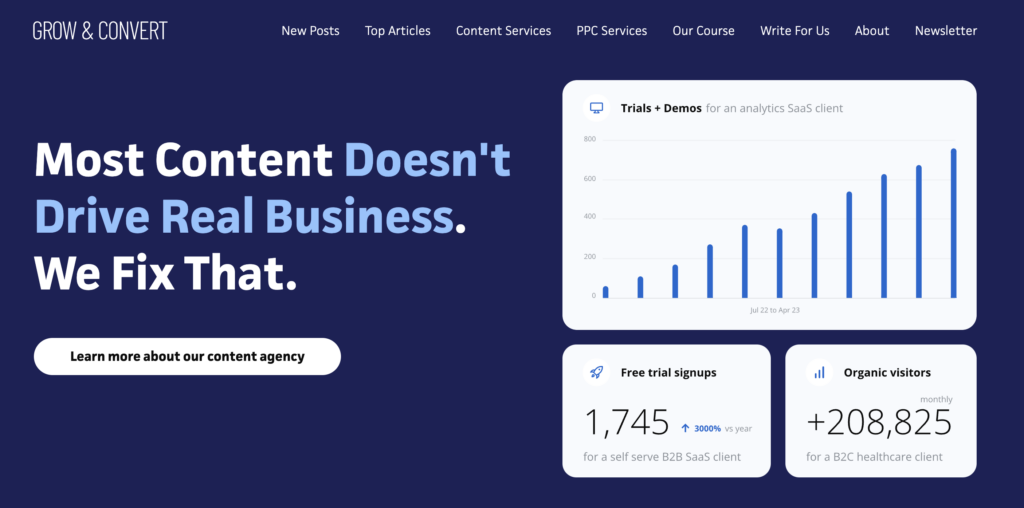
We Legitimately Measure Our Performance on Leads Generated
The number one differentiator of our agency — and the thing that should matter most to any B2B company hiring a content marketing company — is that we measure our performance on leads generated.
That is our benchmark. And that is the goal that our entire strategy and content creation process is based on.
It’s not based on traffic volume or other vanity metrics. It’s based on driving qualified leads.
For every one of our clients, we create an ROI graph like this one (a live graph from a B2B SaaS client we’ve been working with for over 2 years):
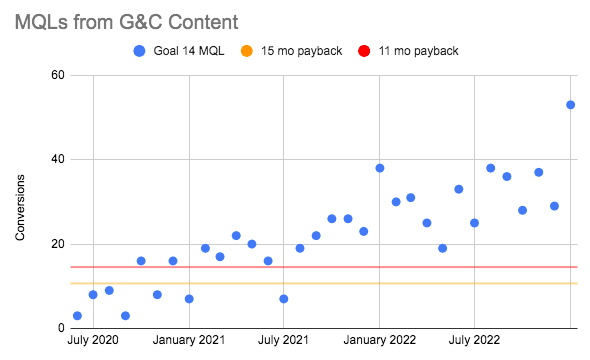
The horizontal lines represent the number of leads this client needs per month to break even on their monthly spend with us. Each month, we plot the number of leads from our articles on this graph. Then we report on our progress in relation to that break even number so clients can see when they begin to have positive ROI.
We’ve written extensively about how we do this here and here. Before we started our agency, this is the type of thing we were looking for but could never find.
Now, because leads are our main goal, the steps of our content production process — and our solutions that correspond to the issues we discussed above — are optimized for this. And that begins with the topics we prioritize.
We Prioritize Bottom of Funnel Topics with High Purchase Intent First to Drive Faster Results
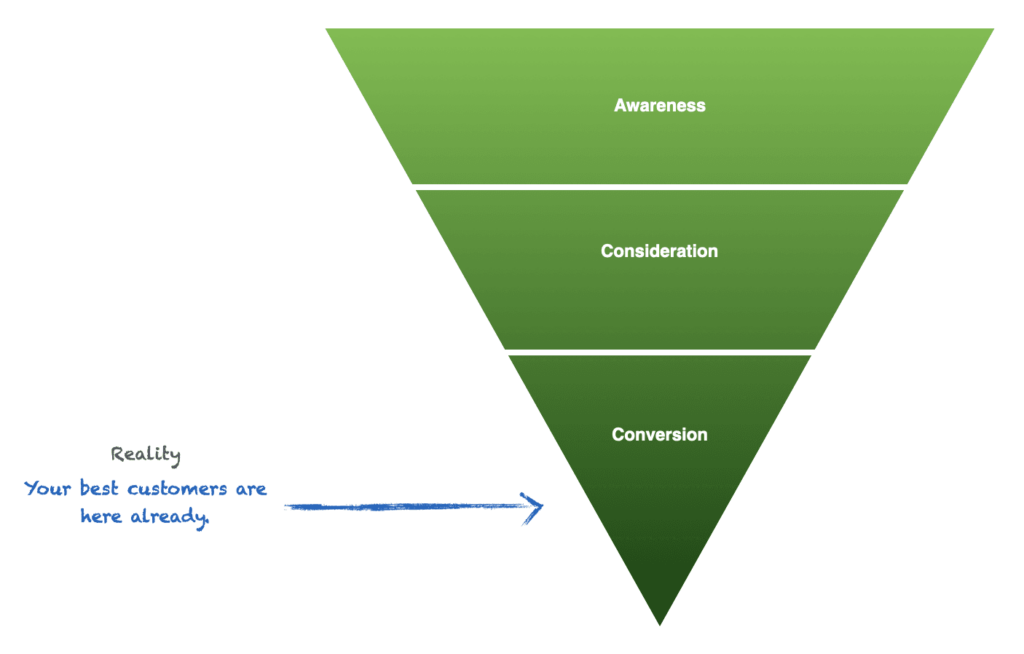
In our experience, we’ve learned that the best content marketing strategy for B2B businesses is to begin by targeting topics and keywords that indicate people searching are ready to buy.
For example, in B2B SaaS, that’s keywords such as:
- Top/Best product category keywords: Keywords like “Best marketing analytics software,” “Best visitor identification software,” “Best video transcription software.”
- Brand/Product comparison keywords: Keywords like “HubSpot vs. Pipedrive” or “QuickBooks alternatives.”
In contrast to TOF topics, where readers generally aren’t in purchase-mode, most people searching these types of terms are actively looking to buy. As a result, conversion rates are much higher — in some cases like 10X higher (a finding that led us to develop our foundational Pain Point SEO strategy).
B2B service businesses can take the same approach by targeting equivalent types of high-intent terms. For example, “best virtual assistant service,” or “business book ghostwriting service” as we’ve tackled for B2B service clients.
Our strategy is to tackle BOF terms first because they convert at a significantly higher rate — allowing us to drive results faster. Then, once we begin exhausting BOF keyword opportunities, we’ll begin working our way up the funnel. We do this very strategically, focusing on pain point-focused topics where there’s a direct product tie-in.
Note: Related to our BOF-first content strategy is our constant emphasis on intent over keyword volume. We’ll happily go after keywords that show minimal search volume in SEO tools if they indicate the searcher has really high intent. And in fact, as we’ve explained in this post, that often results in some of our highest converting pieces for clients.
You can read any of the articles linked above for in-depth discussions of these topics, or see the impact of this strategy via these case studies:
We Interview Experts at Our Clients’ Companies to Write at the Advanced Level of B2B Audiences
Because these BOF topics are very product-centric — and because B2B decision-makers need to be communicated with at an industry expert-level — we don’t produce articles in the “Google research paper” style we described above (where we just self-research a topic and write up what we found, trying ourselves to become the experts).
Instead, our writers start by interviewing people inside your organization who have the know-how and expertise to speak on that topic and convey their ideas into the article.
Thus the writer is not asked to pretend to be an expert themselves. This is a massive shift from traditional content services and is essential to producing genuinely high-quality content.
We’re not talking about grabbing a few quotes from experts to throw into an article. We’re talking about hour long recorded interviews where we shape an entire article around the viewpoint and knowledge of an expert.
This changes everything. It creates true thought leadership content, and adds genuine product expertise into our BOTF pieces discussed above because we’re able to include all the detail and nuance of how your product is differentiated, what it replaces, why features were designed in certain ways, and more that only product experts inside your company would know.
We Have a Two Pronged Content Promotion Process
Finally, we don’t just publish pieces and wait for them to rank in Google. We use a two pronged promotion strategy to drive both short and long term traffic. Specifically:
- Paid Ads / PPC Marketing Campaigns (Short Term Traffic): We use paid ads to promote content using two targeting methods: Cold audiences (using interest and demographic based targeting) and lookalike audiences (based on the client’s existing customer list or website visitors). We test paid channels such as Facebook, Twitter, LinkedIn, and Google Ads based on each client and where we’re most likely to reach their audience.
- Manual Link Building (Long Term Traffic): When certain pieces start ranking for keywords, we strategically deploy link building to boost them to page 1 or the top of page 1 in Google.
The combination of these 2 steps gives our pieces a short term boost in traffic followed by long term sustainable organic traffic that adds up from different articles and grows over time.
Companies also promote the content we create for them through email marketing, sales enablement material, paid ads, etc. — but regardless of how else they use it, we’re actively promoting it for them.
We do all of the above from our own budget, with no extra spend for our clients, making us a truly full-service agency. This is markedly different from other marketing agencies and something we’re very proud of offering our clients.
Further Reading
If you want to learn more, here is a summary of articles linked to above and others where we explain our process in depth:
Finally, if you’re interested, you can reach out about working with us here.
Other B2B Content Marketing Agencies Whose Names We Hear Often
To help B2B businesses weigh different agency options, here are a few other content marketing agencies whose names we’ve heard repeatedly — either through clients having worked with them in the past or just through colleagues in the marketing agency.
Note: We haven’t worked directly with any of these agencies, so we can’t independently vouch for the quality of their work. But that’s why we outlined our 4 criteria of evaluating a B2B content marketing agency above. If you want to reach out to these agencies, we recommend you ask them about each of these 4 B2B content marketing challenges and evaluate for yourself if and how they have a process to solve for them.
2. Animalz
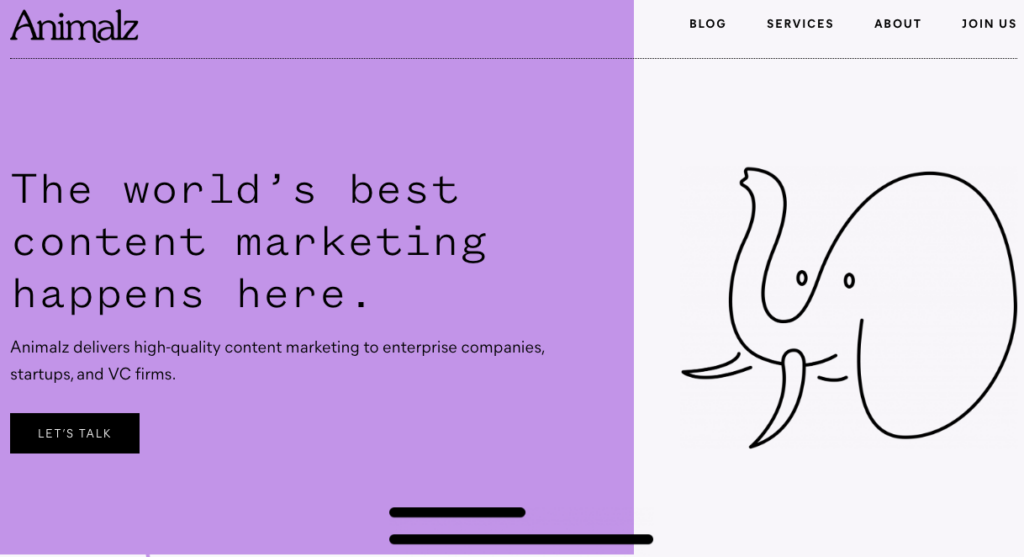
According to their website, Animalz provides content marketing services to enterprise companies, startups, and VC firms.
They list having worked with companies such as Google, Amazon, Airtable, and others. They provide a variety of services including SEO consulting, brand awareness, lead generation, product marketing, and promotion and distribution.
Visit their site for more information about their services, team, podcast, and more.=
3. Siege Media
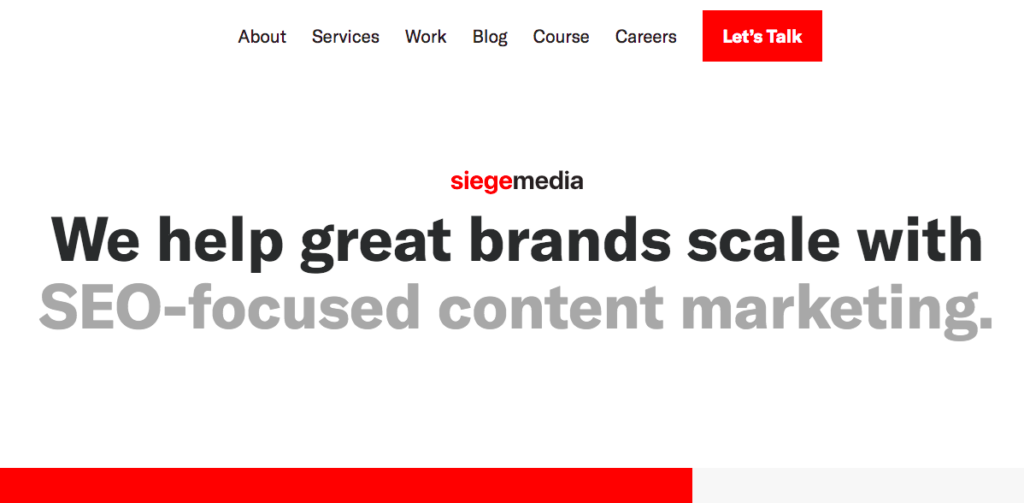
Siege Media is an SEO-focused content marketing agency that offers SEO, content creation, graphic design, and link building services to businesses.
They list having worked with companies such as Zillow, Shutterfly, Tripadvisor, and others. And they say their marketing solutions have generated over $86,856,000 in yearly client traffic value.
Visit their site for more information.
4. Optimist
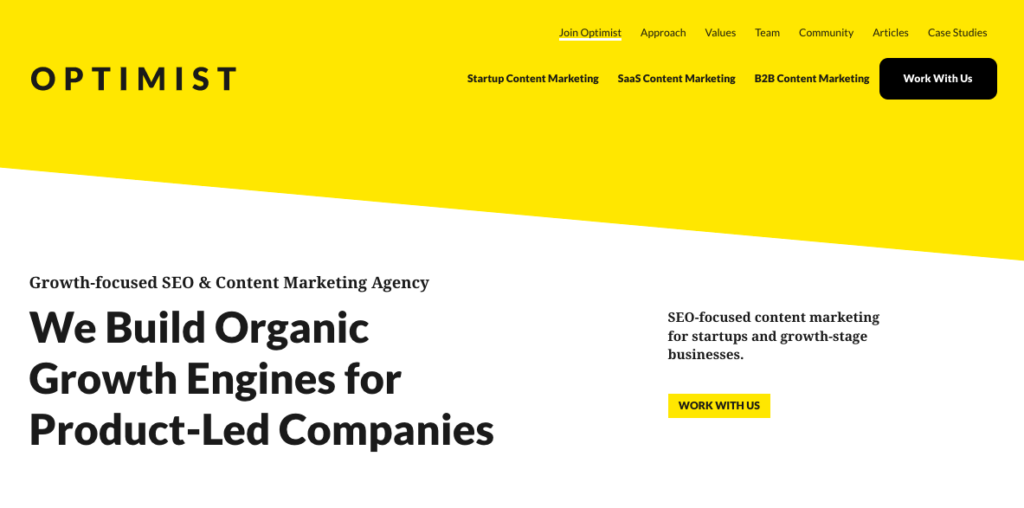
Optimist is an SEO-focused content marketing agency for startups and growth-stage businesses.
They specialize in working with product-led companies, and list having worked with companies such as Contentstack, FairShake, and HelloSign. Their services are broken out into startup content marketing, SaaS content marketing, and B2B content marketing.
Visit their site for more information.
5. Codeless
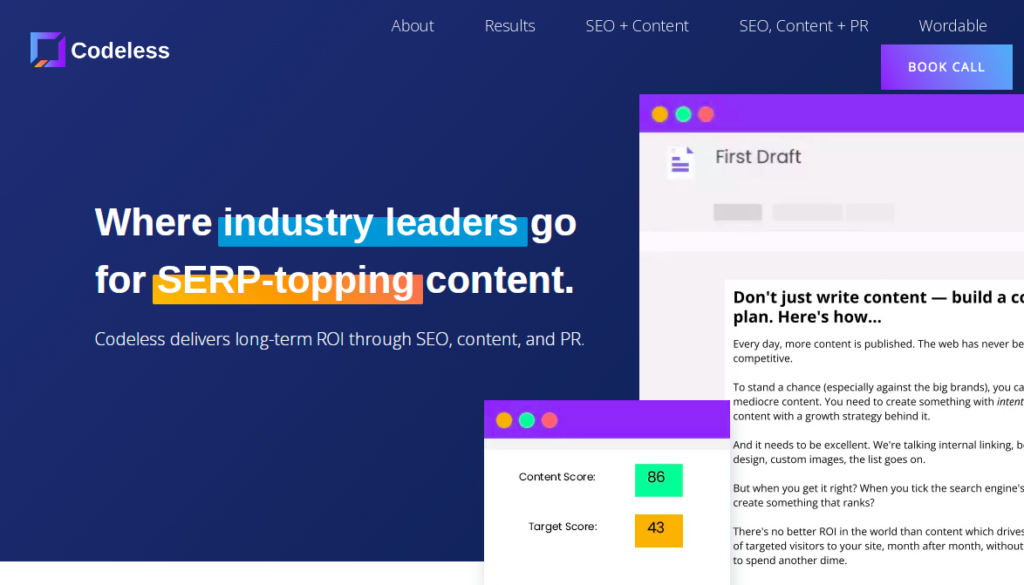
Codeless is a content production company offering a variety of SEO, content, and PR services.
They say they create a proven, customized workflow for every client, and list having worked with companies such as Monday, Zapier, ActiveCampaign, and others.
Visit their site for more information.
6. Omniscient Digital
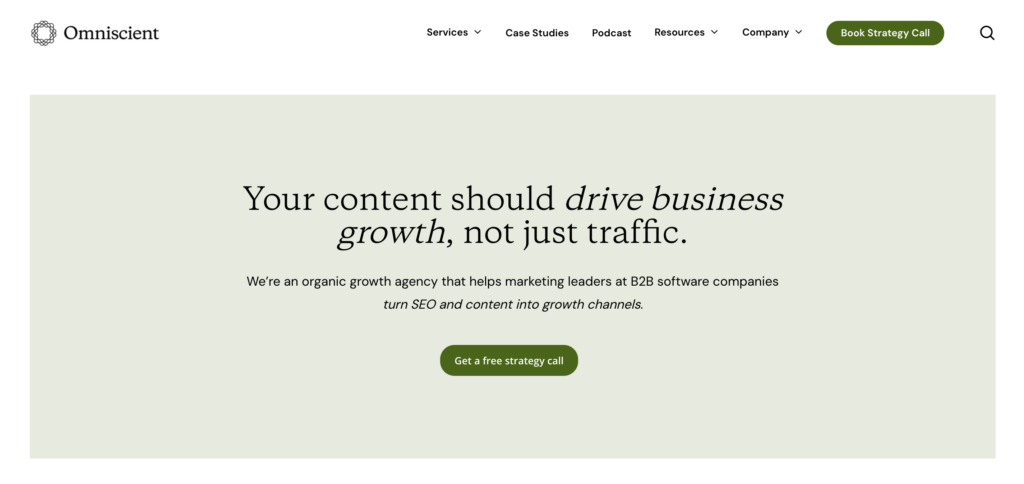
Omniscient is a digital marketing agency that primarily serves fast growing B2B software companies. They claim to tailor their approach to your specific goals, however, they offer a few standard services including strategy consultations, content creation, optimization of existing content, link building, and technical SEO audits.
Visit their site for more information.
7. Seer Interactive
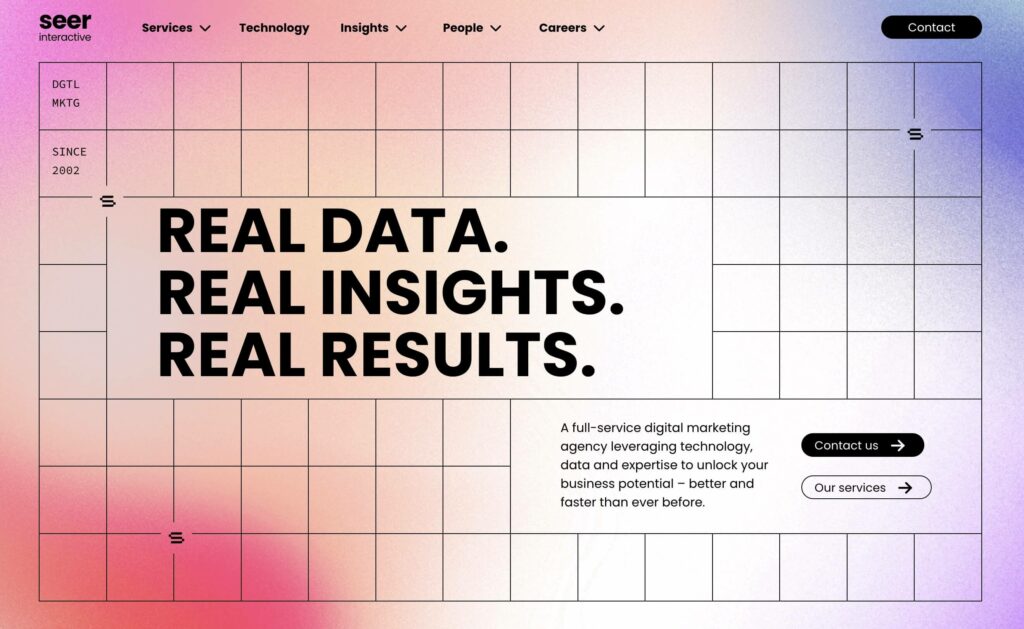
Seer Interactive claims to be a full-service digital marketing agency with a wide variety of services including digital strategy, paid media, content creation (including white papers, infographics, blog posts, and video production), and more. They also offer a data analytics platform to help you identify and track business KPIs.
Visit their site for more information.
8. Graphite
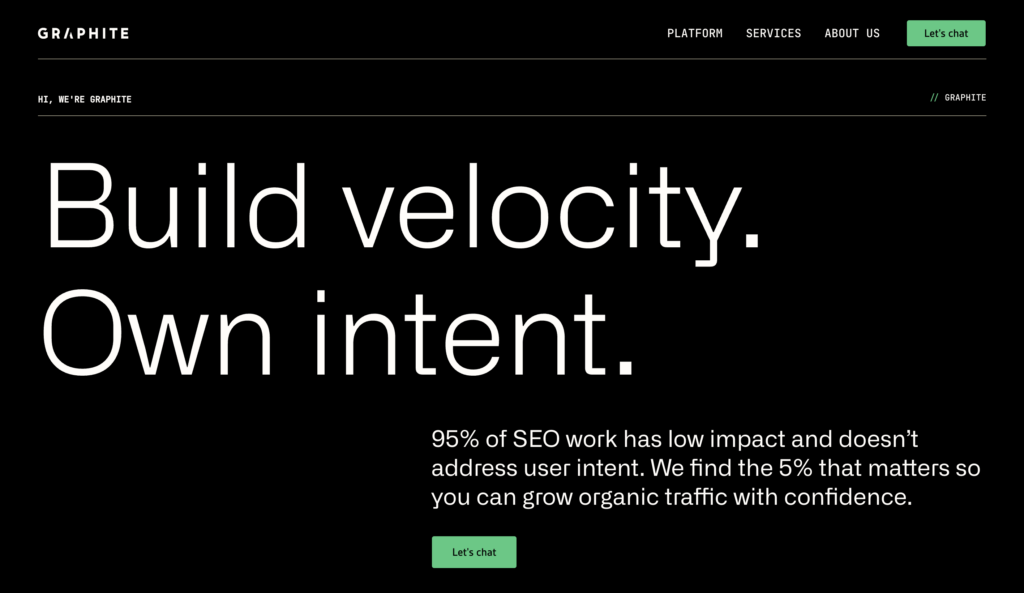
Graphite uses AI to identify groups of keywords with similar intent and to guide the writing process. When it comes to writing, Graphite’s AI will produce an outline and a list of keywords to get your writers started. They also have a proprietary tool to help you with internal link building.
Visit their site for more information.
9. Intrepid Digital
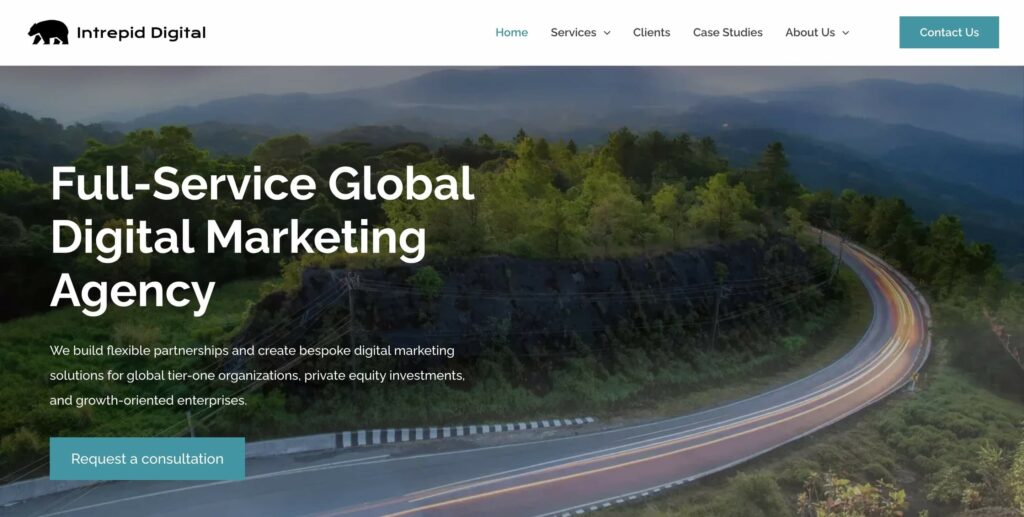
Intrepid Digital gives you direct access to SEO marketing experts and data analytics. They also offer paid media, search engine marketing, UX website design, content creation and strategy, conversion rate optimization that aligns with a great user experience, and more.
Visit their site for more information.
10. Power Digital
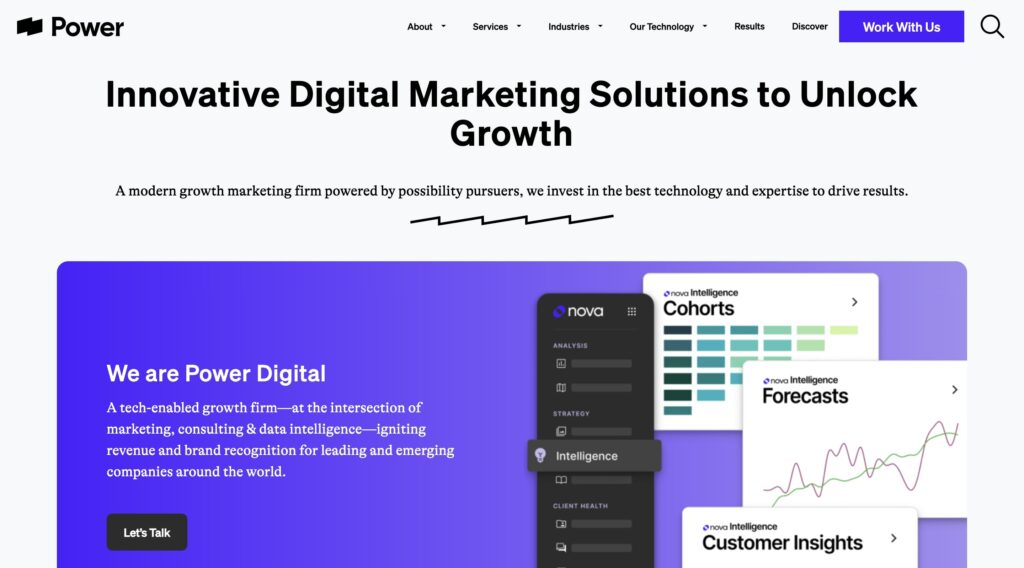
Power Digital is a robust digital agency whose services include web development, web design, influencer marketing, email marketing, and much more. They serve B2B, B2C, fashion, retail media, and private equity companies.
Visit their site for more information
11. Fractl
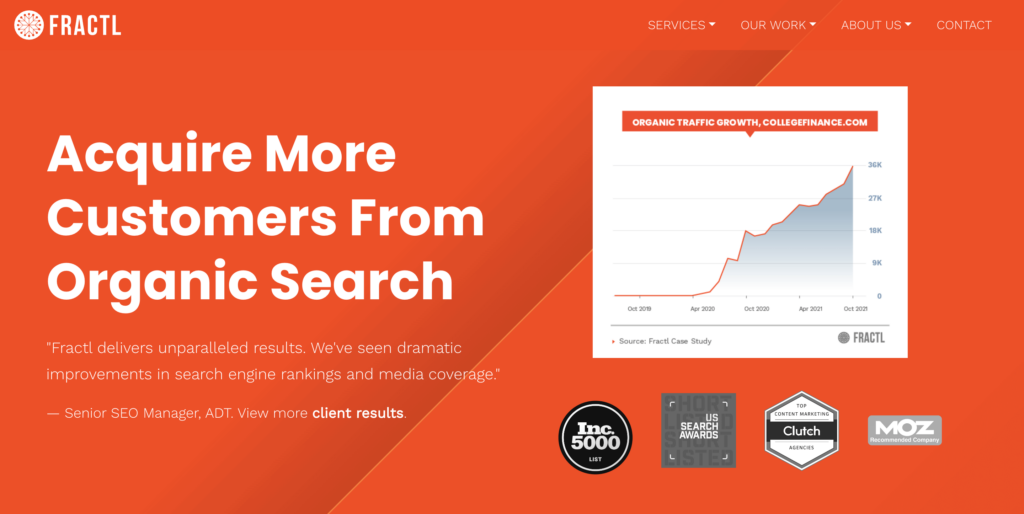
Fractl offers digital PR services, organic growth consulting, content development, and technical SEO. However, they mainly focus on data posts for PR link building in order to increase rankings and media coverage.
Visit their site for more information.
Want to work with us or learn how to implement our B2B content strategy?
- Our Agency: You can learn more about working with us here.
- Our Content Marketing Course: Individuals looking to learn how to grow their SaaS business with content can join our private course, taught via case studies, here. We include lots of detail and examples not found on this blog. Our course is also built into a community, so people ask questions, start discussions, and share their work in the lesson pages themselves, and we (along with other members) give feedback. We also get on live Zoom calls about once a month and dissect members’ actual content strategies and brainstorm ideas on how we’d form content strategies for their businesses.
- Join Our Content Marketing Team: Alternatively, if this style of B2B content marketing appeals to you, consider joining our content marketing team as a writer or content strategist. We have awesome clients. We’re a remote company. We pay well. And you won’t have to stress about getting your own clients or spend a bunch of time doing outreach to get them.
Questions? Comments? Feel free to share them in the comments below and we’ll respond.


